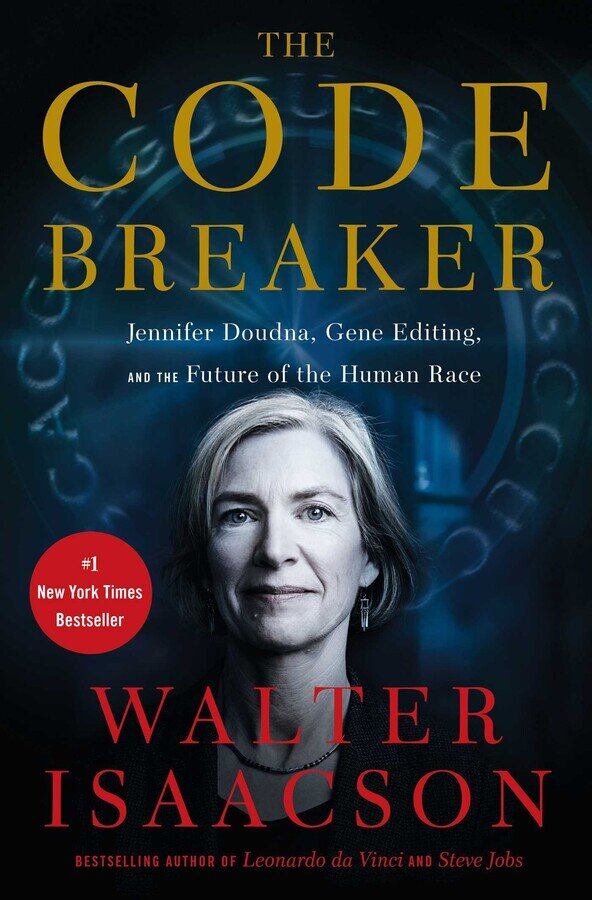The Code Breaker by Walter Isaacson
📝 Briefly about the book…
In 2020, Jennifer Doudna and Emmanuelle Charpentier won Nobel Prize for Chemistry for their contribution to gene editing technologies.
Their technology made it cheaper and simpler to edit our genes. Walter Isaacson not only tells the biography of Jennifer Doudna, but also explores crucial questions that will define human race in the next few decades.
Should we edit our genes to enhance our IQ or the way we look even if we can? 🧬
CONTENTS:
🧠Why you should read this book?
✏️ My favourite quotes
📚Great books this book refers to.
🧬 Fun Facts/ Podcasts
🧠Why you should read this book?
First of all because of Jennifer Doudna! She is an exceptional scientist and a unique role model for everyone. I am so grateful to Walter Isaacson for introducing me the world of Jennifer Doudna and her colleagues. The work they do to advance our human race is incredibly unique.
Second, this technology is going to shape the future of human race more profoundly than, let’s say, the Artificial Intelligence. We will not only be able to cure severe genetics diseases, but also enhance our IQ or the way look. These changes that we will make in our genes will impact not only us, but the future generations to come. Once we edit our DNA it will be changed forever.
And the third reason is that Walter Isaacson is a great science communicator. The way he explains the science behind this gene editing tool helped me (a person who doesn’t know much about genetics) to have a clear understanding how this technology works. I’ve read his biographies of Einstein, Franklin, Da Vinci and Steve Jobs. They were all brilliant.
✏️ My favourite quotes
‘Hypocrisy in search of social acceptance erodes your self-respect’ ~ James Watson
‘Never do something that a thousand other people are doing’ ~ Jack Szostak,
'When you work as I do on weird organisms that live in unusual environments, like very salty ponds, your only motivation is curiosity’ ~ Francisco Mojica
( 🧬 Context: Mojica made a groundbreaking discovery of CRISPR (repeated sequences of DNA) . He discovered it while studying microorganisms that live in salty ponds. If he wasn’t driven by his curiosity, we would have never had this technology. Curiosity is what creates opportunity for innovation.)
‘I wanted to create knowledge, not just learn it.’ ~ Emmanuelle Charpentier, co-discoverer of gene editing tech.
‘Be prepared for unexpected’ ~ Louis Pasteur
📚Great Books Walter Isaacson mentions:
🧬 Other Notes/ Facts 🧬
The discoverer of the DNA structure - James Watson got accepted to the University of Chicago when he was 15! Speak of genius!
Jennifer Doudna was very close to switching her major from chemistry to French. She came to her French tutor to ask if she could switch, and her tutor said: ‘If you major in chemistry you’ll be able to do all sorts of things. If you major in French you will be able to be a French teacher.’
‘Never do something that a thousand other people are doing’ ~ Jack Szostak,
Atom bomb analogy. Isaacson presents to readers a way we can convince ourselves that something ‘is not that bad’ since it’s not different from another ‘X’ bad thing.
When Secretary of War Henry Stimson was wrestling with whether to drop a nuclear bomb on Japan, some argued that it was entirely new category of weapon, a line that should not be crossed.
Others said it was not fundamentally different, and indeed be less brutal, that the massive firebombing campaigns that had been waged on Dresden and Tokyo. The latter side prevailed, and the bomb was dropped.
Later, however, atomic weaponry was classed in a distinct category. It hasn’t been used since.
Isaacson quotes this analogy because some gene editing technology are being justified in a similar manner. However in contrast to atomic bomb, once we edit someone’s genes it won’t be possible to reverse it back.
‘How Do People Get New Ideas’ by Isaac Asimov. You can read it here for free
Check my YouTube video where I explore life of Jennifer Doudna
A cool podcast for super-nerds!









